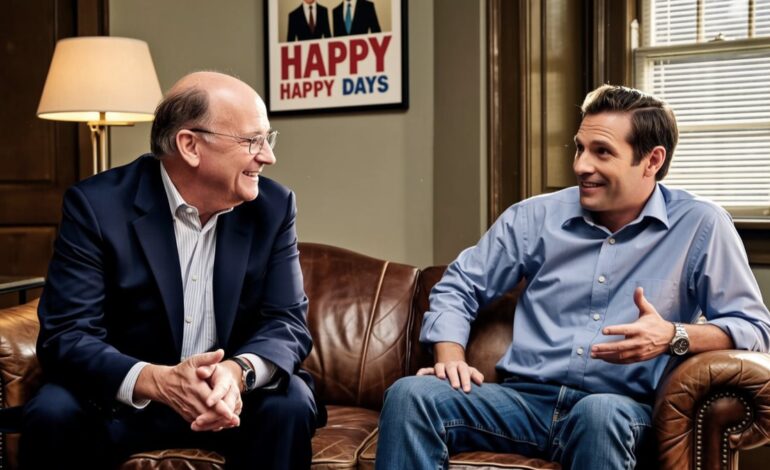Henry Winkler and Ron Howard’s Emotional ‘Happy Days’ Farewell: A Brotherhood Tested by Fame

Maya Rivers here, a self-proclaimed wannabe poet, forever chasing the rhythm in life’s ordinary moments. And yet, here I am, stirred by a tale of brotherhood, ambition, and the fragile threads that bind art and identity. Ah, the quiet ache of parting, the thunderous applause of legacy—such poetic irony.
There are moments in life that feel like the turning of a page—final, irreversible, and yet somehow poetic. For Henry Winkler, that page turned in a quiet corner of stage 19, where a phone booth stood like a sentinel to fate. The call came. Ron Howard, his on-screen brother and off-screen confidant, was leaving Happy Days. And in that instant, Winkler didn’t just lose a co-star—he felt like he was losing a piece of his soul.
“My life is over,” he whispered into the receiver, heart raw and voice trembling. It wasn’t just grief over a friend’s departure; it was the fear that the magic they’d built together—the unspoken rhythm of two actors who could finish each other’s sentences—would never be the same. Howard, ever the visionary, had long dreamed of directing, and now he was stepping away from the show that made them household names.
But what could have been a fracture became a foundation. Winkler, ever the loyal friend, swallowed his panic and offered his blessing. “Go and be the best you can be,” he urged, a line that could have been lifted from a sonnet. And Howard, in turn, carried that trust forward—so much so that when he got the chance to direct Night Shift in 1982, he refused to do it without Winkler. “It became an absolute no-brainer for the studio, if Henry would say yes,” Howard recalled, a testament to their bond.
Yet, even in the glow of success, shadows loomed. Back in the Happy Days era, Winkler had faced a crossroads of his own. When producers floated the idea of rebranding the show as Fonzie’s Happy Days—a nod to Winkler’s meteoric rise—Howard nearly walked away. “I would rather go back to USC and film school,” he told executives, refusing to let the show’s identity be reshaped around a single character, no matter how beloved.
Winkler, too, had drawn his line in the sand. “If you do that, it is an insult to everybody I’m working with,” he insisted. The show, he argued, was not about Fonzie alone—it was about family, about ensemble, about the delicate balance of talent and chemistry. And so, the name stayed. The show endured. And the friendship, though tested, held firm.
Decades later, their respect remains unshaken. Winkler speaks of Howard with reverence, calling him a man “to be trusted as a professional from his hair to his toes.” And Howard, in turn, calls Winkler the kind of presence every actor dreams of working with. “We had a shorthand with the script,” Winkler mused. “He went where I went, I went where he went, and it became something else.”
In a world where fame often fractures friendships, theirs stands as a rare sonnet of loyalty and mutual admiration. And so, the tale concludes, drifting into memory—where art and brotherhood dance on, long after the cameras stop rolling.
Sources: Celebrity Storm and People Magazine, New York Post, Fox News Digital
Generated by AI




